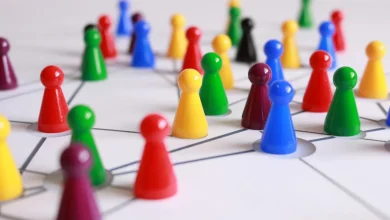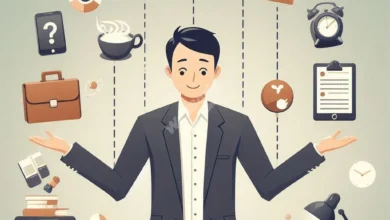The Unseen Impact of Work-Life Imbalance on Mental Health

Imagine a scale where your work sits on one side and your personal life on the other. When both sides are level, you’ve achieved work-life balance. But what happens when that scale tips too far in one direction?
Did you know that 76% of Americans report that work stress affects their personal relationships? This startling statistic highlights a growing concern in our fast-paced world: the hidden toll of work-life imbalance on our mental health.
In this article, we’ll explore the unseen ways that an out-of-kilter work-life balance can impact your mental well-being. More importantly, we’ll provide you with practical strategies to restore harmony and boost your overall happiness.
Understanding Work-Life Imbalance
Before we dive into the mental health impacts, let’s get clear on what work-life imbalance looks like in everyday life.
Signs of Work-Life Imbalance
Are you constantly feeling overwhelmed? Here are some key indicators that your work-life balance might be off:
- Always working late or bringing work home
- Skipping meals or eating at your desk regularly
- Neglecting personal relationships or hobbies
- Chronic fatigue or difficulty sleeping
- Feeling guilty when not working
If these signs sound familiar, you’re not alone. Many of us struggle with maintaining a healthy balance in today’s demanding world.
Factors Contributing to Work-Life Imbalance
Several factors can push us towards an unhealthy work-life balance:
- Technology: Smartphones and laptops make it easy to stay connected to work 24/7. While this can boost productivity, it also blurs the line between work and personal time.
- Workplace Culture: Some companies praise employees who work long hours, creating pressure to always be “on.” This can lead to a culture where overwork is the norm.
- Personal Expectations: Many of us set high standards for ourselves. We might feel we need to work harder or longer to meet these self-imposed goals.
- Economic Pressures: In tough economic times, fear of job loss can drive people to overwork, trying to prove their value to employers.
Understanding these factors is the first step in addressing work-life imbalance. By recognizing the signs and causes, you can start to make positive changes that benefit your mental health.
The Mental Health Consequences of Work-Life Imbalance
When the scales tip too far towards work, our mental health often pays the price. Let’s explore the hidden costs of an imbalanced life on our psychological well-being.
Stress and Anxiety
Chronic stress is often the first sign that work is overtaking life. When we’re constantly “on,” our bodies remain in a state of high alert. This can lead to:
- Persistent feelings of worry or unease
- Difficulty relaxing or “shutting off” from work
- Physical symptoms like headaches or muscle tension
Did you know? According to the American Institute of Stress, 83% of US workers suffer from work-related stress. This constant pressure can evolve into full-blown anxiety disorders if left unchecked.

Depression
When work demands overshadow personal needs and relationships, depression can creep in. Signs may include:
- Persistent sad or empty feelings
- Loss of interest in activities once enjoyed
- Changes in sleep patterns or appetite
The link between overwork and depression is real. A study published in the Journal of Epidemiology found that people who worked more than 55 hours per week had a higher risk of developing depression compared to those working standard hours.
Burnout
Burnout is the extreme end of work-life imbalance. It’s characterized by:
- Emotional exhaustion
- Cynicism or detachment from work
- Reduced professional efficacy
Burnout isn’t just feeling tired or stressed—it’s a state of complete mental and physical exhaustion. The World Health Organization now recognizes burnout as an occupational phenomenon, highlighting its serious impact on health and productivity.
Cognitive Function
Work-life imbalance doesn’t just affect our emotions—it can impair our thinking too. Overwork and stress can lead to:
- Difficulty concentrating
- Memory problems
- Reduced decision-making ability
These cognitive effects can create a vicious cycle, making work even more challenging and time-consuming.
Relationships and Social Life
When work takes center stage, personal relationships often suffer. This can result in:
- Feelings of isolation
- Strain on friendships and family relationships
- Reduced social support network
Remember, strong social connections are crucial for mental health. When we neglect these relationships, we’re removing a key pillar of our psychological well-being.

The Ripple Effect: Beyond Mental Health
The impact of work-life imbalance extends beyond our mental state, affecting various aspects of our lives.
Physical Health Implications
Our mental and physical health are deeply interconnected. Poor mental health due to work-life imbalance can manifest physically as:
- Weakened immune system
- Increased risk of cardiovascular problems
- Digestive issues
- Chronic pain
Work Performance and Productivity
Ironically, overworking often leads to decreased productivity. When we’re mentally exhausted, our work suffers. This can result in:
- Reduced creativity and innovation
- More mistakes and oversights
- Longer time to complete tasks
Personal Life Satisfaction
Ultimately, work-life imbalance can erode our overall quality of life. This might look like:
- Feeling unfulfilled despite career success
- Missing out on important life events or milestones
- Losing touch with personal interests and hobbies
By understanding these far-reaching effects, we can better appreciate the importance of maintaining a healthy work-life balance.
Recognizing the Signs: When Work-Life Imbalance Affects Your Mental Health
It’s crucial to identify when work-life imbalance is taking a toll on your mental well-being. Here’s a self-assessment checklist to help you evaluate your situation:
Self-Assessment Checklist
Ask yourself these questions:
- Do you often feel overwhelmed or unable to cope with work demands?
- Is it difficult to relax or enjoy leisure time without thinking about work?
- Have you neglected personal relationships or hobbies due to work commitments?
- Do you frequently feel exhausted, even after a full night’s sleep?
- Has your motivation or job satisfaction significantly decreased?
- Do you often skip meals or eat unhealthily due to work pressure?
- Is it hard to remember the last time you took a proper vacation?
- Do you feel guilty when not working?
If you answered “yes” to several of these questions, it might be time to reassess your work-life balance.

Warning Signs to Watch For
Be alert to these key indicators that your mental health is being affected:
- Persistent anxiety or worry about work
- Difficulty sleeping or changes in sleep patterns
- Mood swings or irritability
- Physical symptoms like headaches, muscle tension, or digestive issues
- Feelings of hopelessness or lack of purpose
- Increased use of alcohol or other substances to cope with stress
- Social withdrawal or isolation from friends and family
Recognizing these signs early can help you take action before the impact becomes more severe.
Strategies for Restoring Work-Life Balance
Achieving work-life balance is an ongoing process, but there are practical steps you can take to improve your situation.
Setting Boundaries
Establishing clear boundaries between work and personal life is crucial:
- Define work hours: Set specific start and end times for your workday and stick to them.
- Create a dedicated workspace: If working from home, designate a specific area for work to help mentally separate work from personal time.
- Limit after-hours communication: Avoid checking work emails or messages outside of work hours.
- Learn to say no: It’s okay to decline additional tasks or commitments that would overextend you.

Time Management Techniques
Effective time management can help you achieve more without working longer hours:
- Prioritize tasks: Use methods like the Eisenhower Matrix to focus on what’s truly important.
- Break big projects into smaller tasks: This makes them less overwhelming and easier to manage.
- Use the Pomodoro Technique: Work in focused 25-minute intervals with short breaks in between.
- Schedule breaks: Include short breaks in your workday to recharge and maintain productivity.
Prioritizing Self-Care
Self-care is not selfish—it’s essential for maintaining good mental health:
- Exercise regularly: Even short walks can boost mood and reduce stress.
- Practice mindfulness or meditation: These techniques can help manage stress and improve focus.
- Maintain a healthy diet: Proper nutrition supports both physical and mental well-being.
- Ensure adequate sleep: Aim for 7-9 hours of quality sleep each night.
- Pursue hobbies: Engage in activities you enjoy outside of work.
- Spend time in nature: Regular exposure to green spaces can reduce stress and improve mood.

Seeking Support
Remember, you don’t have to face work-life balance challenges alone:
- Talk to your supervisor: Discuss your workload and explore possible solutions.
- Connect with colleagues: Share experiences and strategies with coworkers who may be facing similar challenges.
- Lean on friends and family: Strong personal relationships can provide emotional support and perspective.
- Consider professional help: If you’re struggling, don’t hesitate to seek support from a mental health professional.
By implementing these strategies, you can start to restore balance and protect your mental health.
The Role of Employers in Promoting Work-Life Balance
While individuals can take steps to improve their work-life balance, employers play a crucial role in fostering a healthy work environment. Here’s how organizations can support their employees’ well-being:
Creating a Supportive Workplace Culture
A positive workplace culture can significantly impact work-life balance:
- Lead by example: Managers should model healthy work-life balance behaviors.
- Encourage breaks: Promote regular breaks and lunch hours away from work stations.
- Respect personal time: Avoid contacting employees outside of work hours unless absolutely necessary.
- Recognize achievements: Celebrate successes without promoting overwork.

Flexible Work Arrangements
Flexibility can help employees manage their work and personal responsibilities more effectively:
- Flexible hours: Allow employees to adjust their start and end times when possible.
- Remote work options: Offer the ability to work from home, either full-time or on a hybrid schedule.
- Compressed workweeks: Consider options like four-day workweeks or nine-day fortnights.
Did you know? A study by Gartner found that 43% of workers believe flexible working hours help them achieve greater productivity.
Employee Assistance Programs
Employee Assistance Programs (EAPs) can provide valuable support for mental health:
- Counseling services: Offer free or subsidized access to mental health professionals.
- Stress management workshops: Provide training on coping strategies and resilience.
- Work-life balance resources: Offer tools and information to help employees manage their time and energy.
Conclusion
Maintaining a healthy work-life balance is not just a luxury—it’s essential for our mental health and overall well-being. By recognizing the signs of imbalance, implementing strategies to restore harmony, and fostering supportive work environments, we can protect ourselves from the hidden toll of an out-of-kilter life.
Remember, achieving work-life balance is an ongoing process. It requires regular self-assessment, adjustment, and sometimes, the courage to make significant changes. But the rewards—better mental health, improved relationships, and a more fulfilling life—are well worth the effort.
Take action today:
- Assess your current work-life balance using the checklist provided.
- Choose one strategy from this article to implement this week.
- If you’re struggling, don’t hesitate to reach out for support, whether to a friend, family member, or professional.
By taking these steps, you’re investing in your long-term health, happiness, and success. Remember, a balanced life is not about perfection, but about making conscious choices that align with your values and well-being.

Additional Resources
To further support your journey towards better work-life balance and mental health, consider exploring these resources:
Books on Work-Life Balance and Mental Health
- “The 7 Habits of Highly Effective People” by Stephen Covey
- “Atomic Habits” by James Clear
- “Boundaries: When to Say Yes, How to Say No to Take Control of Your Life” by Henry Cloud and John Townsend
Reputable Websites for Further Information
- National Alliance on Mental Illness (NAMI): www.nami.org
- Mental Health America: www.mhanational.org
- World Health Organization – Mental Health: www.who.int/health-topics/mental-health
- Mind Tools (for work-life balance strategies): www.mindtools.com
Remember, your mental health matters. By prioritizing work-life balance, you’re not just improving your own life—you’re contributing to a healthier, more productive society. Take the first step today towards a more balanced, fulfilling life.


